Home
The So Far So Close Festival and its exercises in closeness
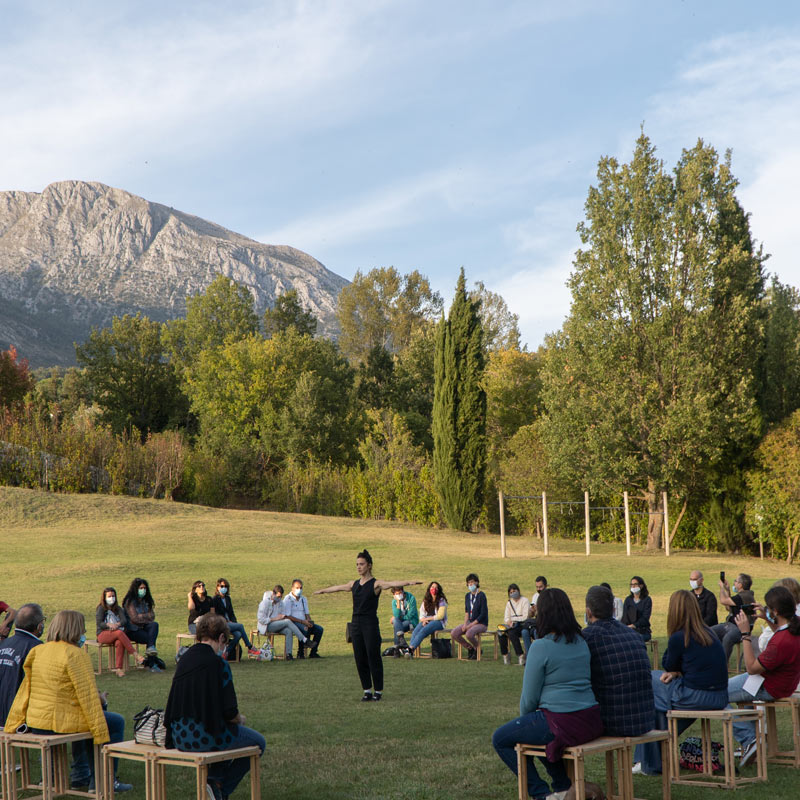
A few hours after the Prime Minister's Decree suspending public events in theatres, cinemas and open spaces, the “So Far So Close. Esercizi di vicinanza” Performing Arts Festival reached its conclusion in Matera on Saturday 24 October.
We welcomed seven artists and companies (Emma Dante, Virgilio Sieni, Chiara Guidi, Annamaria Ajmone, Luigi Coppola, the Compagnia MK and Daria Deflorian and Antonio Tagliarini, who updated their questions in the middle of a pandemic, placing proximity – including in relation to the relationship between interpreting reality and constructing the imaginary – at the heart of their work, and focusing on the relationship between the human and non-human, and between the visible and invisible.
We put on ten works and sixteen repeat performances, including theatre, dance, cinema and public and relational art, characterised by interventions in a redesigned public space using forms of opening that were able to include the public not only in the enjoyment of a finished work, but in very different ways, in the responsibility for constructing it.
Approximately 2,000 spectators attended the performances, while around 50 citizens were involved in the three workshops set up in Matera with the artists.
Matera was not the only location of the Festival programme. Another six municipalities in Basilicata hosted the performing arts of our "exercises in closeness": Montescaglioso, Venosa, San Mauro Forte, Latronico, San Severino Lucano and Cirigliano.
All the events were held in full compliance with the laws on preventing contagion, which were communicated using the arrangements set up by the Open Design School, which over the past months studied and tried out the system for hosting the public so that in spite of the distance, those taking part in a performance would be able to feel that they were fully involved in it and were protagonists in complete safety.
The objective was reached! The data from the monitoring questionnaires at the end of the performances, which successfully involved not only Matera 2019’s loyal public but also a completely new audience, tell us that a fifth of the attendees travelled from Puglia, especially from Bari, Taranto and Valle d'Itria. 70.7% of the participants stated that the physical distancing measures that were adopted did not affect their participation, while 90.4% reported that they were satisfied with the security and the contagion prevention methods that were adopted.
Special thanks go out to our wonderful team of volunteers, who succeeded in offering a warm welcome to the public despite the gloves and masks, and conveyed the kindness and enthusiasm that had distinguished them throughout 2019!
Read and download the manual here: So Far So Close. Practices of infra-pandemic.
The "So Far So Close" Festival
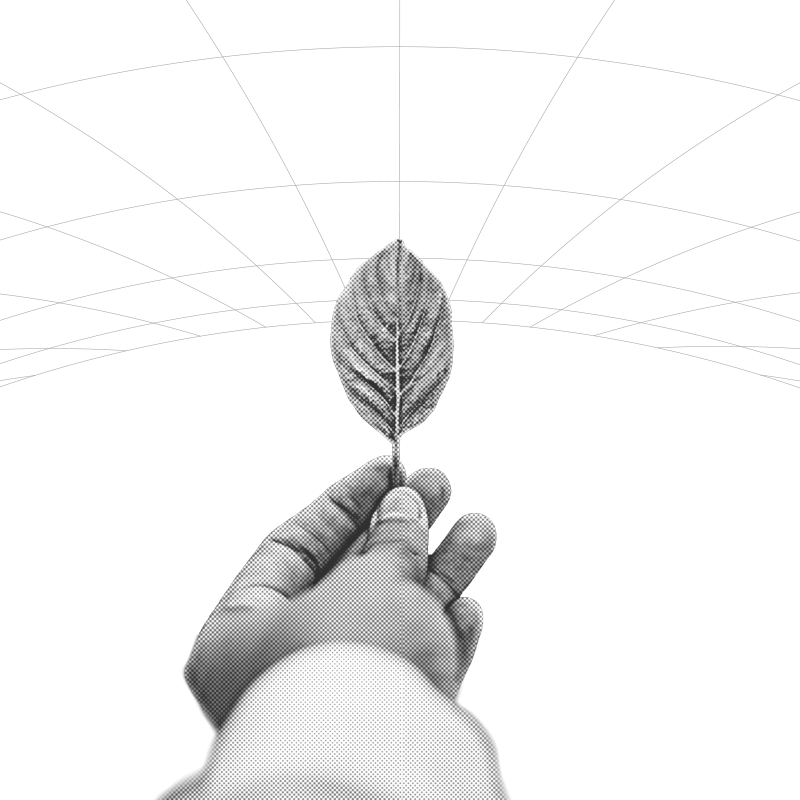
- Immagine condivisione Facebook:

From 12 September to the end of October, Matera and various remote areas of Basilicata Region will be the venues for the “So Far So Close. Esercizi di vicinanza (exercises of closeness)” Festival of Performing Arts produced by the Matera Basilicata 2019 Foundation, with artistic collaboration from Silvia Bottiroli and Cristina Ventrucci, in partnership with APT Basilicata and ASM Matera and under the patronage of the Municipalities of Matera, Montescaglioso, Venosa, San Mauro Forte, Cirigliano, Latronico and San Severino Lucano.
The “So Far So Close" programme offers exercises of closeness as a way of re-embracing the existing reality through the performing arts, with a new awareness of our shared lives in an "infected planet", and rediscovering the force of collective action.
The Festival’s leading artists are Emma Dante, Virgilio Sieni, Chiara Guidi, Annamaria Ajmone, MK, Motus, Deflorian and Tagliarini and Luigi Coppola, who for the occasion take a careful, delicate new look at the relationships created by live meetings. Proximity is a central element of their work, including in terms of the relationship between interpreting reality and constructing the imagination, in which the theatre in all its forms and with all its influences – from drama to performance, from the relationship with the cinema and music to dance and from the experience of public and relational art – becomes a tool for studying relations and places through intertwined narratives, and dedicating attention to the relationship between the human and the non-human and between the visible and invisible in a city that has always brought these dimensions together as its vocation.
In Matera and in Basilicata, we propose exercises for a renewed citizenship, in the wake of the experience that made our land a special place for shared creative processes and the relationship between art and space in the course of 2019.
Through the research carried out by the Open Design School, a project that was a pillar of Matera 2019, the Festival is an experiment aimed at putting on live events in the time of COVID by means of a study of new relationships and codes of social behaviour so that notwithstanding the distance between them, participants in the performance can feel that they are fully involved and protagonists in it. Emblematically, the name "So Far So Close" is an expression both of the work that is intended to be done on the new relations among people in the time of social distancing and the new relations that can be constructed between urban and remote areas.
Quanto dura un anno a Matera?

- Immagine condivisione Facebook:
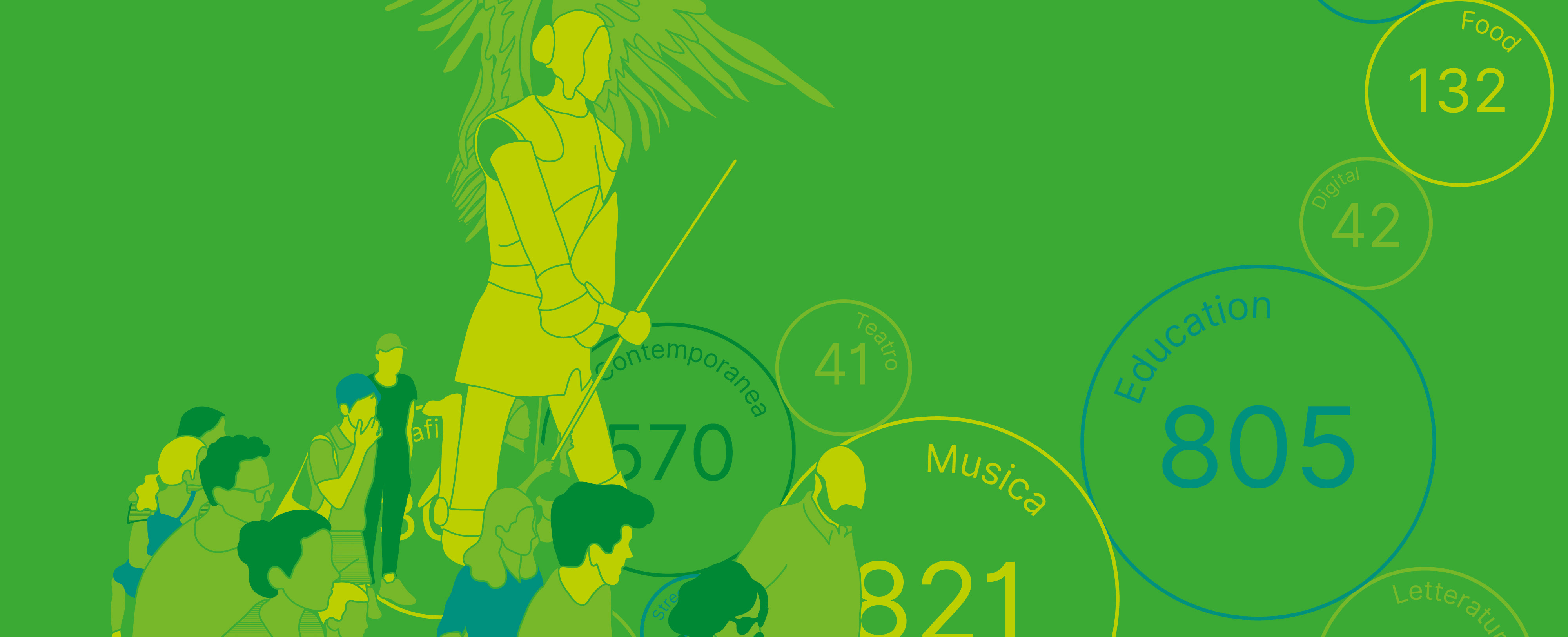
Quanto dura un anno a Matera?
A questa domanda proveremo a rispondere giovedì 30 luglio dalle 17:00 in diretta streaming da Casa Cava con la presentazione del report di monitoraggio dell'anno di Matera Capitale Europea della Cultura e il nuovo portale open data.
Nel corso dell'evento analizzeremo le sfide poste già dal dossier di candidatura di Matera 2019: l'investimento sulle produzioni originali, la cittadinanza culturale, gli impatti sociali.
Parteciperanno all'incontro esperti del terzo settore e della cultura tra cui Carlo Borgomeo (Presidente Fondazione con il Sud), Pierluigi Sacco (IULM), Carola Carazzone (presidente Assifero), Giuseppe Bruno (presidente CGM), Marta Ragozzino (Direzione Regionale Musei Basilicata), Giampaolo d'Andrea (consigliere del Ministro Franceschini), Franco Bianchini (Università di Hull), Rossella Tarantino (Fondazione Matera Basilicata 2019), Paolo Verri, Giuseppe Laterza (Editori Laterza), Marianna Dimona (Comune di Matera), un rappresentante dei produttori culturali di Matera 2019, da poco costituitisi in Comitato. Concluderanno i lavori i rappresentanti del Consiglio di Amministrazione della Fondazione Matera-Basilicata 2019.
Segui la diretta streaming sul canale YouTube di Matera 2019 e interagisci con i relatori!
Al via il FabLab di Open Design School
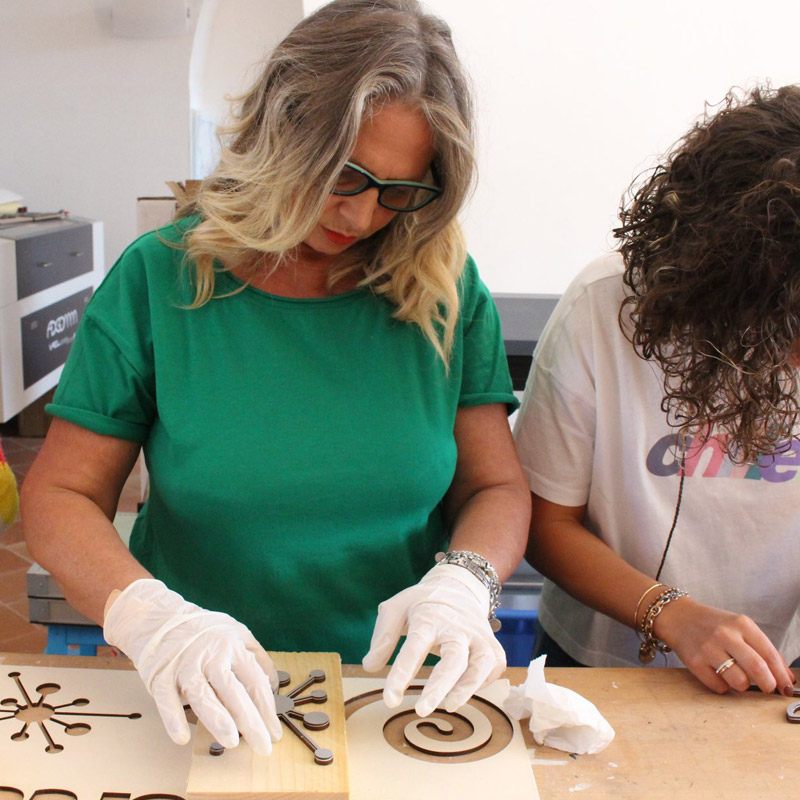
- Immagine condivisione Facebook:
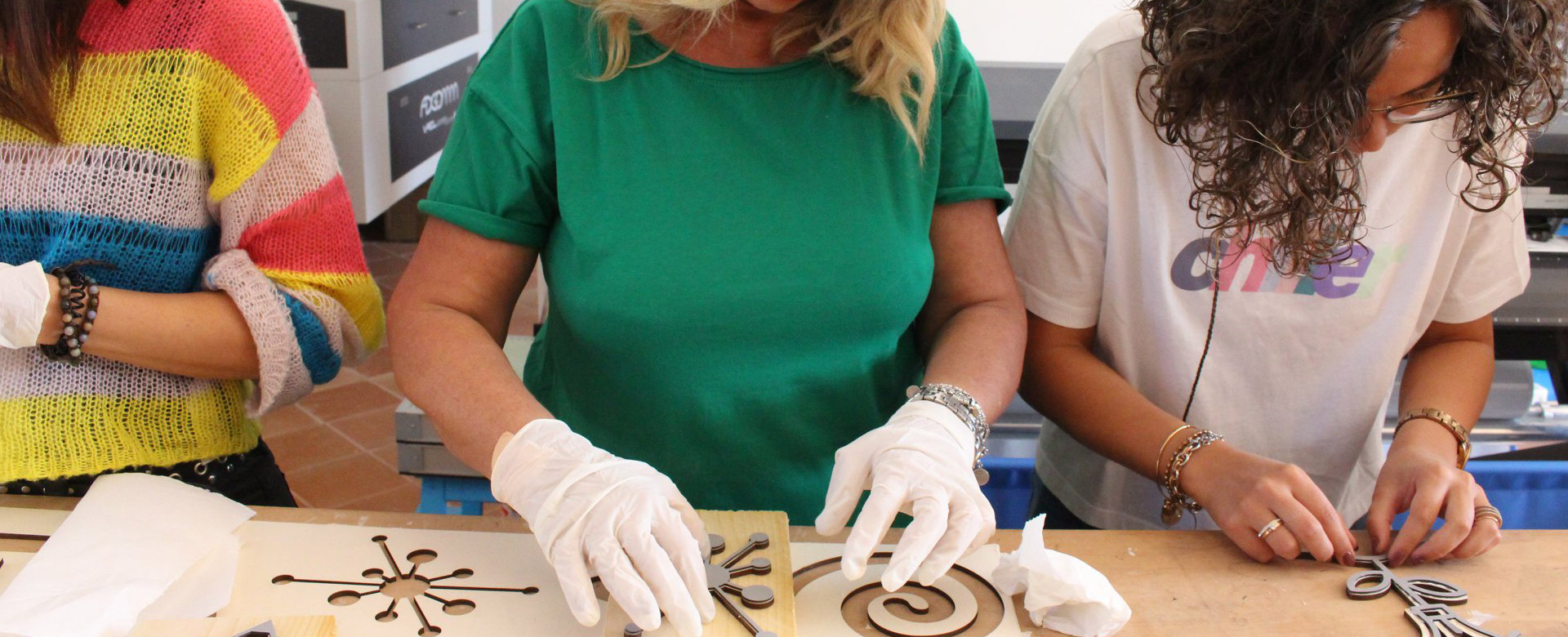
Dal 23 Luglio ripartono le attività laboratoriali presso Casino Padula, con il lancio delle attività del FabLab di Open Design School O.Ma.S. “Open Maker Space”, abbreviato in “O+”, un laboratorio di fabbricazione, analogica e digitale, in cui promuovere la sperimentazione, l’apprendimento, l’invenzione, la prototipazione.
Se sei esperto potrai usarlo come piattaforma di ricerca e sviluppo di progetti, gli utenti occasionali potranno soddisfare esigenze progettuali individuali, le imprese potranno innovare un prodotto o processo, la comunità dei FabLab lo utilizzeranno per attività condivise e senza limiti di età potrai acquisire nuove competenze.
Il FabLab ‘’O+’’ offrirà l’utilizzo di macchinari avanzati, la consulenza su prototipazione e produzione, i corsi di formazione, lo spazio coworking, gli eventi su temi di interesse dell’utenza. Importante sarà la collaborazione con aziende locali e la sperimentazione della formula del FabLab diffuso, che si avvarrà della partnership con la rete di FabLab locali Officine Mediterranee, con cui Open Design School da tempo collabora.
La fase di lancio delle attività, in partenza il 23 Luglio e in programma fino al 7 Agosto, vedrà l’attivazione di workshop gratuiti, il giovedì dedicati ai bambini dai 7 ai 12 anni e il venerdì ai ragazzi dai 13 ai 19 anni.
Le attività che proponiamo sono differenziate per fascia d’età, ma avendo in comune l’approccio non formale, il learning by doing e l’apprendimento tra pari, caratteristiche tipiche dei FabLab e del modello Open Design School. I principali ambiti di formazione saranno il design e la stampa 3D, il coding e la robotica, la fabbricazione analogica e digitale.
Le attività per i bambini dai 7 ai 12 anni si avvarranno di strumenti semplificati, che consentano un approccio alle tecnologie nella forma del gioco e con il raggiungimento di obiettivi immediati. La stampa 3D sarà introdotta mediante l’uso di penne 3D, strumenti che consentono la comprensione della trasformazione fisica della materia e dei principi base della stampa in modo diretto e per mezzo della manualità del bambino. Il disegno 3D al computer utilizzerà il software TinkerCAD, pensato per avvicinare i più piccoli ai principi del disegno virtuale. Il coding sarà applicato all’interazione con semplici robot autocostruiti e alla realizzazione di storie di fantasia in ambienti in cui l’architettura avrà un ruolo fondamentale. Saranno inoltre sperimentate applicazioni ludiche di Arduino.
Con i ragazzi dai 13 ai 19 anni impiegheremo anche gli strumenti tecnologici disponibili in laboratorio, come la vinyl cutter, le stampanti 3D, il taglio laser. L’obiettivo è quello di sviluppare in loro la volontà di proporre e produrre, collettivamente, progetti originali nei campi della tecnologia, del design e dell’architettura mediante l’utilizzo di software professionali e kit Arduino.
I workshop si terranno a Casino Padula il giovedì e venerdì, dalle 18:00 alle 20:00, e saranno accessibili ad un massimo di 8 utenti.
Per l’iscrizione è necessario inviare una mail all’indirizzo This email address is being protected from spambots. You need JavaScript enabled to view it. entro il martedì precedente al workshop di interesse.
Di seguito il calendario con le attività:
Giovedì 23/07, ore 18.00 - 20.00 - Bambini 7-12 anni SOLD OUT
Graffiti: utilizzeremo la pittura parietale come esempio di produzione per sottrazione. Realizzeremo un telo, decorato in gruppo con colori a tempera e cartoncini decorati con pastelli a cera per rimozione di strati.
Output: Telo decorato in gruppo e cartoncini personalizzati.
Venerdì 24/07, ore 18.00 - 20.00 - Ragazzi 13-19 anni SOLD OUT
Decoreremo le tazze Matera 2019 con il pattern ODS e il logo O+.
Output: tazze decorate da portare a casa.
Venerdì 31/07, ore 18.00 - 20.00 - Ragazzi 13-19 anni SOLD OUT
Disegno 3D con TinkerCAD
Un’introduzione al mondo CAD 3D mediante un software online gratuito che permetterà di comporre geometrie solide predefinite per ottenere oggetti anche complessi. Adatto a tutti, anche a coloro che non hanno esperienza con i software CAD e desiderano avvicinarsi al design 3D in modo semplice e intuitivo.
Output: un modello virtuale tridimensionale che sarà riprodotto in stampa 3D nell’appuntamento successivo.
Sabato 01/08, ore 10.00 - 12.00 - Bambini 7-12 anni SOLD OUT
Disegno 3D con TinkerCAD
Un’introduzione al mondo CAD 3D mediante un software online gratuito che permette di comporre geometrie solide predefinite per ottenere oggetti anche complessi. Adatto anche ai bambini, darà la possibilità di acquisire concetti quali la spazialità e la prospettiva.
Output: modello virtuale di un oggetto.
Giovedì 06/08, ore 18.00 - 20.00 - Bambini 7-12 anni SOLD OUT
Con l’utilizzo delle penne 3D creeremo oggetti tridimensionali per un’esperienza di gioco che consentirà ai bambini di acquisire in modo semplice concetti complessi, quali la geometria dello spazio e i principi del disegno e della stampa 3D.
Output: oggetti 3D in plastica ecologica da portare a casa.
Venerdì 07/08, ore 18.00 - 20.00 - Ragazzi 13-19 anni SOLD OUT
Stampa 3D
Una panoramica sulla stampa 3D, i principi di funzionamento e i campi di applicazione. Utilizzeremo la stampante 3D a filamento plastico per realizzare un modello e mostrare come avviene la costruzione di oggetti.
Output: oggetto modellato nel workshop del 31/07.
Tutti i workshop si svolgeranno nel rispetto della normativa anti-Covid, pertanto gli utenti avranno l’obbligo di indossare la mascherina e saranno sottoposti alla rilevazione della temperatura in ingresso.





